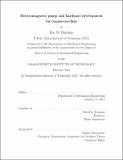Electromagnetic pump and hardware development for organs-on-chips
Author(s)
Bhushan, Brij M
DownloadFull printable version (29.08Mb)
Other Contributors
Massachusetts Institute of Technology. Department of Mechanical Engineering.
Advisor
David L. Trumper.
Terms of use
Metadata
Show full item recordAbstract
MicroPhysiological Systems (MPS), also called organs-on-chips, attempt to mimic the relevant human multi-organ physiology in-vitro. They have potential applications in drug development and personalized medicine by enabling more accurate testing of physiological drug response earlier in the development cycle. On-platform pumps provide greater flexibility and design freedom and are a key feature of such platforms. One approach to multi-organ MPS platforms has been developed in our lab and uses an open-well system to culture tissues of various organs. A common fluid-media circulates between the organs using on-platform pneumatic diaphragm micro-pumps. These pumps require significant effort in setup and depend on external pressure and vacuum sources. An independent, portable pump with low power consumption is desirable. There are also on-going efforts in the field to make sterile platform components low-cost and single use, to reduce user setup time and sterilization effort. This thesis describes a scaled-up version of an ElectroMagnetic (EM) pump. The pump uses a teeter-totter EM actuator having a low energy consumption of about 1 mJ/stroke. The EM actuator minimizes energy by a latching design that requires a short pulse of energy only to switch its state and its springs store energy which is recovered in the reverse stroke. This thesis also describes injection-molded, single-use platforms with onboard pneumatic diaphragm micro-pumps. It describes various valve and pump geometries and a model to predict large deflections of polymer diaphragms. We integrate the EM actuators with these platforms, demonstrating temperature rise of less than 0.1 'C, valve sealing up to 60 kPa, and a pumping frequency of 1 Hz, limited by diaphragm behavior. In addition, we improve platform features using spillways which allow for better passive leveling of fluid height between MPSes. This thesis also presents the selection of polymer tubing to resolve condensation issues in pneumatic channels of an MPS platform inside a cell culture incubator.
Description
Thesis: S.M., Massachusetts Institute of Technology, Department of Mechanical Engineering, 2018. This electronic version was submitted by the student author. The certified thesis is available in the Institute Archives and Special Collections. Cataloged from student-submitted PDF version of thesis. Includes bibliographical references (pages 255-260).
Date issued
2018Department
Massachusetts Institute of Technology. Department of Mechanical EngineeringPublisher
Massachusetts Institute of Technology
Keywords
Mechanical Engineering.